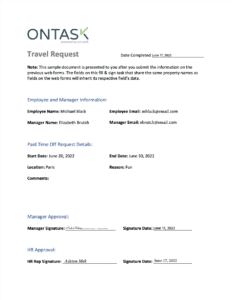What is Contract Management Software?
Contract management software is a technology that streamlines the contract lifecycle through features like document generation, workflow automation, and centralized documentation. Many companies use a contract management tool because it enables their teams to operate more efficiently and consistently.
These tools’ automation can be important to effective contract management strategies. Before choosing a solution, firms should make a list of core features that answer their unique business needs.
10 Key Features of Contract Management Software
Each company has a set of unique needs their ideal solution should fill. Still, the most effective contract management systems will share a core set of capabilities. Here are the top ten contract management software features we recommend looking for.
1. Customizable Templates

Document generation is one of the most time-consuming aspects of a legal team’s work. Team members can save significant time if they use a contract management solution that offers templates they can customize according to the specific situation.
Look for a contract manager with a robust template library covering common document types, and allowing firms to easily edit relevant sections.
2. eSignature Integration
Except for specific contract types requiring wet signatures, eSignature is becoming the way of the future. The ability to electronically sign a document is quicker, more convenient, and can be more secure with the right parameters. A contract management solution that doesn’t integrate eSignatures is at a severe disadvantage: it forces involved parties to go outside the platform to sign, undermining efficiency. Going outside the platform can mean:
- Insecurely-stored, unaccounted-for printed copies
- Process delays as participants put off signing or forget entirely
- Duplicate files re-uploaded from a third-party app or physical scanner
- The possibility of information leaks or tampering through unverified third-party apps
Firms should make sure their tool of choice offers integrated eSignatures. This helps keep one, secure version of the document (and a single source of truth) – and encourages speedy contract completion.
3. Centralized Database
When a firm doesn’t have an integrated filing system, legal teams can spend too much time trying to gather related documents across files, emails, and collaborative apps. Reliable, centralized documentation helps ensure everyone is on the same page about their contractual relationships.
When reviewing contract management tool features, keep an eye out for platforms that centralize all related matter and case documentation. Being able to see everything in one place can transform the firm-client relationship.
4. Search and Reporting Tools
Even with a centralized database, teams need to be able to find key information quickly without poring over large volumes of data. For example:
- How will a legal team find answers to a question on precedent that affects a current contract?
- What if a lawyer wants to find a specific phrase or concept from a past contract to analyze or repurpose – but doesn’t remember exactly where it was used?
- If a contract negotiation is held up, can managers see which tasks or parties it’s waiting on?
Robust contract management systems feature a way to search a firm’s contract data for targeted language. Similarly, managers need an easy way to access key insights on a contract’s progress, assigned roles, and permissions, as well as how team members are performing.
For optimal efficiency, consider solutions that provide natural language processing (NLP) to search documents for terms and concepts. A good solution should also offer a reporting tool that automatically pulls custom stats and facts, like contract renewal deadlines, workflow status, and financial information.
5. Audit Trail
This feature is actually a function of at least two others: centralized documentation and search and reporting tools. When an organization’s information is scattered unreliably across multiple filing systems and platforms, establishing compliance or remedying poor practices can be difficult. It can also be challenging (or impossible) to generate reliable statistics or reports.
If you’re relying on technology to manage your contracts, ensure it creates clear, accessible audit trails. This is a best practice for daily functioning, but it’s also crucial to have clear records and data for auditors. The potential risks of falling short are simply too great.
6. Contract Approval Workflow
Approving a contract is central to the contract management process, so tools to manage its workflow should be included in any effective tool. Look for an automated process that can be customized. Contract management software should allow firms to:
- Determine each party’s role and permissions
- Set up task alerts that trigger after key events or dates
- Show workflow progress
- Easily collaborate
- Centralize all related communication and documents
Without this feature, firms could risk dropping important tasks, generating confusion during contract negotiations, losing crucial communication threads, and failing to comply with legal obligations.
7. Alert and Notification System

Alerts and notifications are part of any well-designed workflow management solution. As discussed above, firms should be able to customize these alerts. Look for the capability to set alerts to automatically trigger when a deadline is reached or a task is completed. This helps avoid delays and missed requirements.
8. Artificial Intelligence (AI)
AI can bring contract management automation to a new level. We discussed NLP, one function of artificial intelligence, in the section on intelligent search and reporting. But the most powerful solutions take advantage of AI on many levels.
Keep an eye out for platforms that offer the power of artificial intelligence to supercharge things like:
- Generating new documents – Go beyond pre-designed templates when your team needs a specially-customized document. Instead of being forced to write a new contract from scratch, intelligently generate an editable document based on targeted AI prompts.
- Fine-tuning workflows – Use NLP and other AI processes to analyze documents and route them appropriately in an existing workflow. This can cut significant time by eliminating manual analysis and modifications.
- Offering user-friendly summaries – Legal documents can be overwhelming for non-legal professionals. AI can generate a clear summary of what the document contains to orient involved parties before they delve in. This sneak peek can clue customers in on what to look for and make it easier to ask the right questions before signing.
9. Integrations
A lot of the efficiency a contract management tool offers can be undermined by having to jump between incompatible apps and systems. So look for a solution that can integrate multiple systems smoothly. Does the platform offer native integrations like Zapier, OneDrive, Salesforce, and ChatGPT? How robust is its API – does it allow custom-branded white-label integrations?
The more seamlessly a firm’s various contract management processes can communicate, the greater efficiency it can enjoy.
10. Ease of Use
Even the most impressive features can be functionally useless with a poorly designed user interface. So evaluate a solution’s usability. How intuitively can teams access its various functions? Does it visually prioritize the most useful or important features to avoid decision fatigue and overwhelm? How accessible and helpful are its training materials and customer support teams? The solution a firm selects should be one its legal department or team will use and appreciate.
Pitfalls to Avoid When Choosing Contract Management Software
It’s important not to end up with a tool that doesn’t interface well with a firm’s actual needs, existing processes, or growth plans. Let’s look at three common issues to steer clear of when selecting a contract manager solution.
Poorly Designed User Interface
User experience (UX) design best practices say a tool should focus on solving a limited set of problems as simply as possible. Avoid tools that seem to have a “kitchen sink” approach to design. This can indicate sloppy, ineffective problem-solving – and bury potentially helpful features amid a sea of useless ones. It may also indicate the design process wasn’t user-focused.
Limited Scalability
A tool may work well for a new, smaller firm – but it may not be able to adapt to growing and changing needs. To avoid having to overhaul as they grow, firms should narrow their search to tools designed to scale with the business. It will save time, money, and other resources in the long run.
Lack of Integration Options
A platform that can’t integrate with other processes and apps can only offer limited efficiency to legal teams. So avoid solutions that remain siloed, as they may end up adding complexity to the process – negating any streamlining they offer.
Learn More About Docubee Contract Management Software
As firms seek to improve their processes, the right tech can make all the difference. With a solution like Docubee’s digital contract management, firms can enjoy:
- Seamless integration and automation
- Leading-edge AI features including NLP
- Smart, customizable document generation
- Flexible workflows
- Stringent compliance
Don’t let inefficiency force your team to hover over important tasks! Learn how your firm can zip through the contract lifecycle with Docubee.











